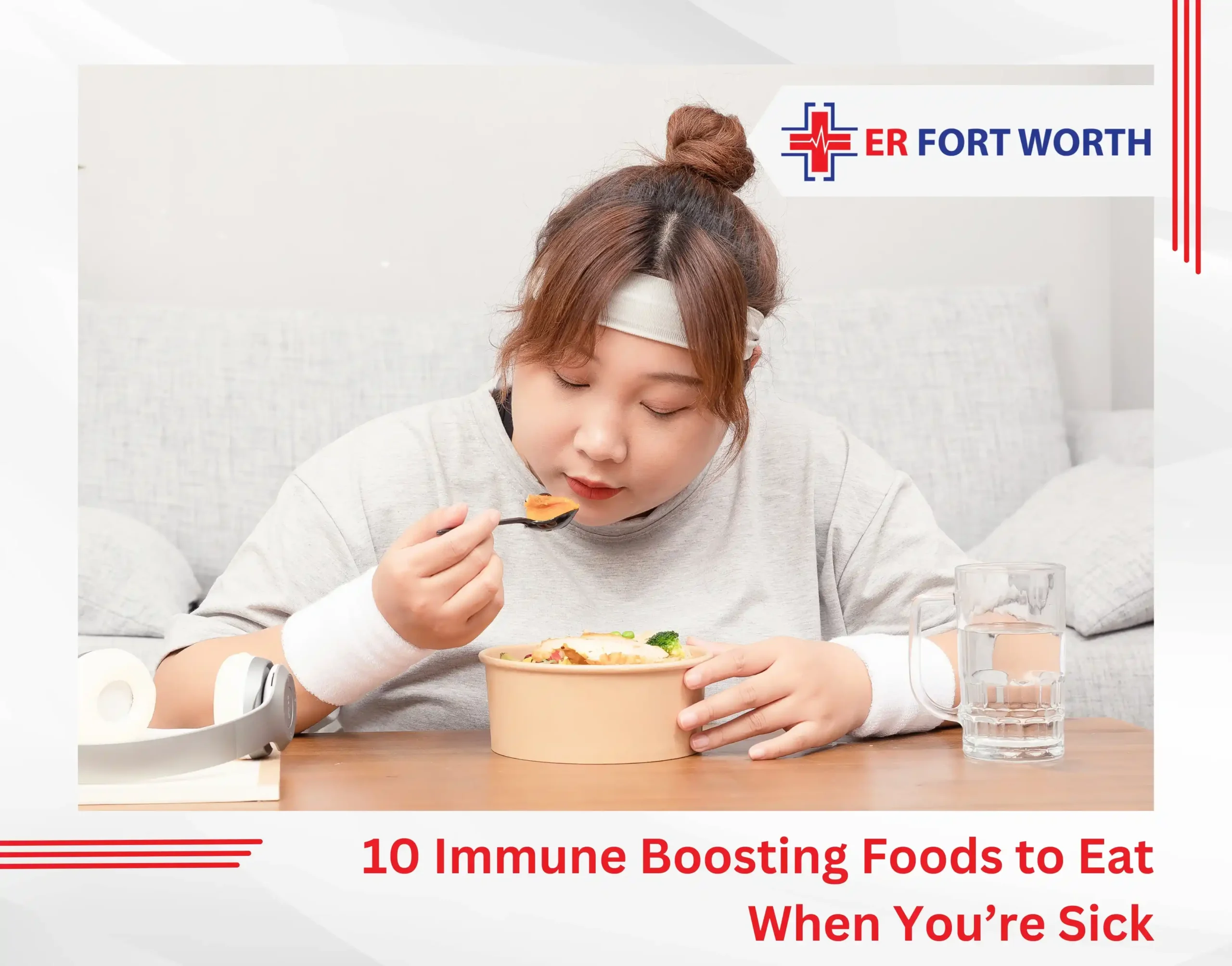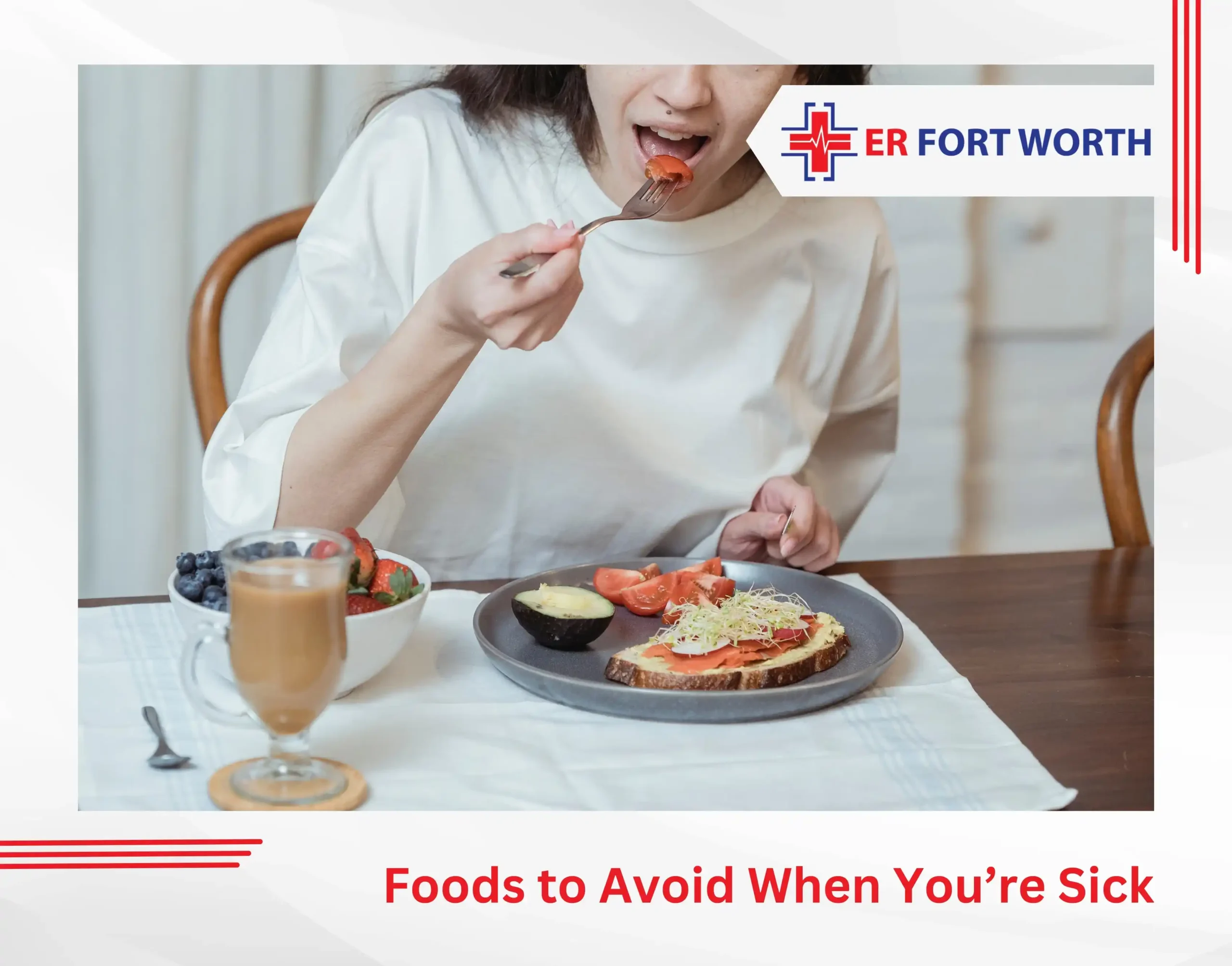Here’s something most people never hear from their doctor: nearly 70% of your immune system is linked to your gut, so what you eat directly shapes how well you recover. That’s why choosing the best foods to eat when sick is crucial. The immune system utilizes proteins, vitamins, and minerals from your diet to produce antibodies, repair tissues, control inflammation, and mitigate the risk of complications.
The right food also replenishes the good bacteria that antibiotics often deplete. On the other hand, eating too much processed or sugary food can throw your gut off balance, cause inflammation, and slow down recovery.
So whether you’re fighting off the flu, a cold, or a stomach bug, knowing the best foods to eat when sick can help your body bounce back faster.
10 Immune Boosting Foods to Eat When You’re Sick

Let’s walk through some of the best foods to eat when sick and how each one helps your body heal naturally.
1. Broths and Soups¹
Warm broths like chicken soup and vegetable broth are classic comfort foods for recovery. They help keep you hydrated and provide electrolytes, such as sodium and potassium. The warm liquid helps clear nasal congestion and soothes sore throats.
2. Citrus Fruits and Vitamin C Rich Foods²
Fruits like oranges, grapefruits, kiwi, and strawberries are loaded with vitamin C, an antioxidant that supports immune cell production. Studies suggest that vitamin C can slightly shorten the duration of colds and enhance immune response.
3. Ginger and Herbal Teas³
Ginger is a powerful root with natural anti-inflammatory and nausea-fighting properties. Ginger contains bioactive compounds like gingerol that may reduce oxidative stress and inflammation.
4. Bananas and Easy to Digest Foods⁴
When your appetite is low or your stomach feels sensitive, bananas, rice, applesauce, and toast (the BRAT diet for illness) can be lifesavers. These bland foods are easy to digest, provide quick energy, and help replenish nutrients lost through vomiting or diarrhea.
5. Oats and Whole Grains⁵
Warm oatmeal provides fiber, vitamins, and minerals that support gut health and stabilize blood sugar levels. Beta-glucan in oats has immune-modulating properties that can enhance the body’s defenses.
6. Leafy Greens and Cruciferous Vegetables

Spinach, kale, broccoli, and Brussels sprouts are packed with vitamins A, C, and K, plus antioxidants that help repair tissues. These vegetables promote the production of infection-fighting white blood cells.
7. Yogurt and Probiotic Foods⁷
Probiotics (beneficial bacteria found in yogurt, kefir, and other fermented foods) are among the best foods to eat when sick, as they play an essential role in supporting immune health. A healthy gut microbiome helps regulate immune responses and may shorten respiratory infections.
8. Honey⁸
Honey has natural antibacterial and soothing effects. A spoonful of honey in tea or warm water can relieve coughing and throat irritation. Honey has been shown to reduce cough frequency and improve sleep in people with upper respiratory infections.
9. Garlic and Onions⁹
Garlic and onions are rich in sulfur-containing compounds that support immune defense and exhibit natural antimicrobial properties. In particular, allicin, the active compound in fresh garlic, has shown antiviral and antibacterial activity in laboratory and limited human studies. Some clinical evidence suggests that regular garlic intake may reduce the incidence of common colds, making them among the best foods to eat when sick, though more research is needed to confirm its effect on symptom severity.
10. Hydrating Fluids¹⁰
Illness often leads to dehydration, particularly when fever, vomiting, or diarrhea are present. Rehydrating with water, herbal teas, or electrolyte-rich drinks helps the body recover by maintaining fluid balance and regulating temperature. Adequate hydration also supports overall metabolic and cellular functions, which are essential during illness.
Foods to Avoid When You’re Sick

Diet for illness isn’t just about what you eat, it’s also about what you skip. Avoid these foods that can slow down recovery or upset your stomach:
- Sugary foods: Suppress immune response and promote inflammation.
- Dairy (for some): Can thicken mucus for those with respiratory congestion.
- Caffeine and alcohol: Dehydrate the body and interfere with sleep.
- Greasy, fried foods: Harder to digest and can irritate an upset stomach.
Final Thoughts
Healing doesn’t happen overnight, but every small, mindful choice helps your body regain strength bit by bit. With the best foods to eat when sick, your immune system can work at its best to help you recover quickly and naturally.
If your symptoms are severe, like persistent vomiting, high fever, dehydration, or weakness, it’s important to seek medical help right away.
ER Fort Worth is here for you, day and night. Our team moves fast with on-site labs and advanced imaging to pinpoint the cause of your illness. Whether it’s the flu, food poisoning, infection, or something more serious, we provide fast relief with IV fluids, medications, and personalized care.




